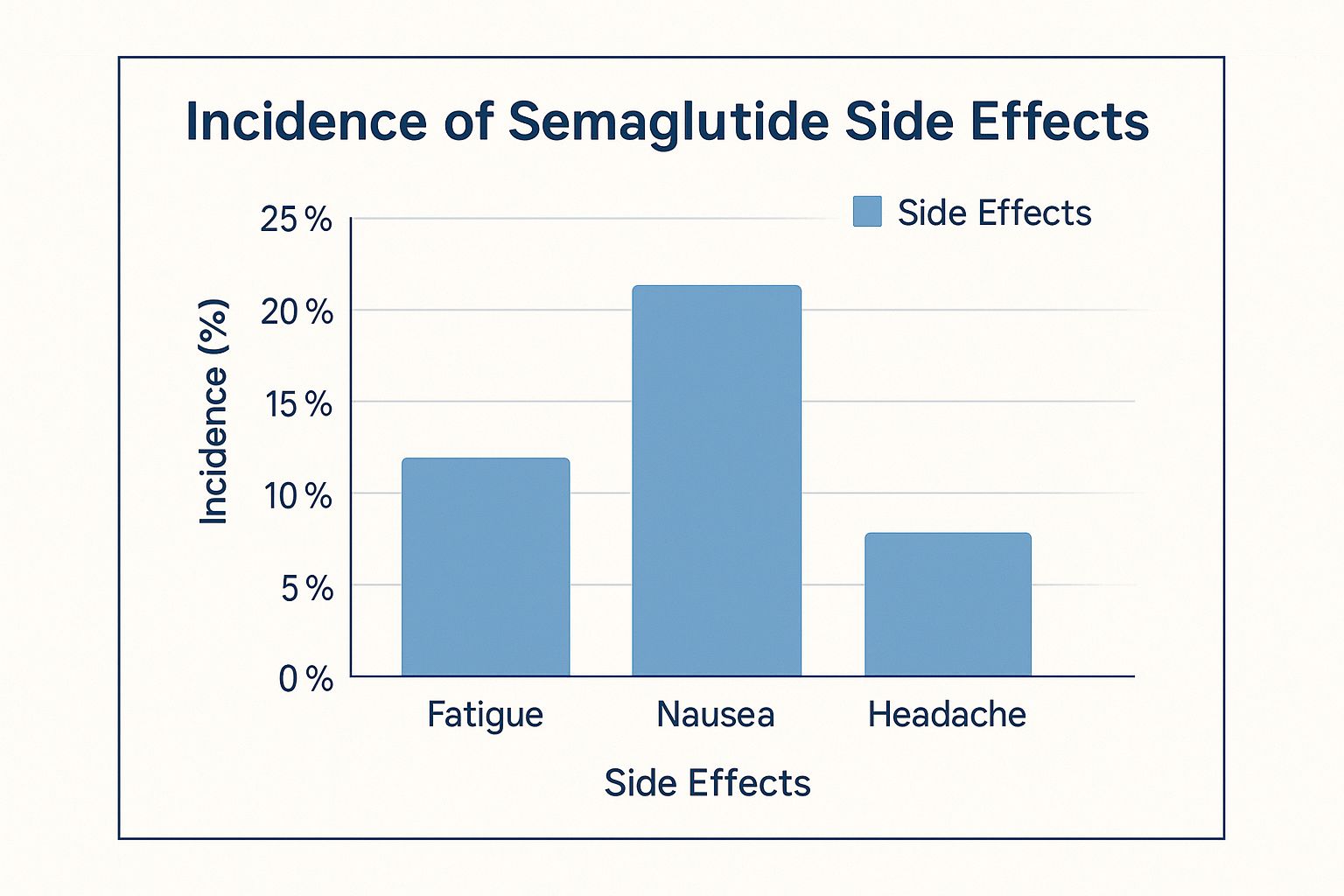
Does Semaglutide Make You Tired? Causes & Tips to Boost Your Energy
Share
If you're wondering, "Does semaglutide make you tired?" the simple answer is, yes, it can. Feeling a bit sluggish is a known side effect of this medication, especially when you're just starting out.
But here’s the key takeaway: it doesn't happen to everyone. For those who do experience it, the fatigue is usually a temporary phase. Think of it as an adjustment period—your body is getting used to a powerful new tool in your weight management journey. Most people find this initial tiredness is mild and fades away after the first few weeks.
Yes, Semaglutide Can Cause Fatigue—But It's Manageable

Starting any new health regimen, especially with a medication like a GLP-1 agonist, involves a period of getting acclimated. Your body is recalibrating how it handles energy and digestion, and that process can take a little time to get used to.
The good news is that this feeling is well-documented. It’s not just in your head; there are clear biological reasons for it, which we'll explore. Knowing that what you're experiencing is normal can be incredibly reassuring as you navigate your path to better health.
Semaglutide and Fatigue at a Glance
For a quick overview, here's what you need to know.
| Aspect | What You Should Know |
|---|---|
| Is it common? | Yes, fatigue is one of the more frequently reported side effects. |
| Why does it happen? | It's linked to changes in blood sugar, lower calorie intake, and slower digestion. |
| How long does it last? | For most people, it's most noticeable during the first few weeks and subsides over time. |
| Is it serious? | Typically, it's mild and manageable. However, you should discuss severe or persistent fatigue with your provider. |
This table gives you the highlights, but understanding the why is key to managing the how.
What to Expect in the Beginning
During the first few weeks, as your system adjusts to semaglutide, a dip in your normal energy levels is common. This is directly tied to the medication's core functions—slowing down digestion and influencing your blood sugar regulation.
This is a critical phase where your body is laying the groundwork for long-term benefits, like sustainable weight management and better metabolic health. The best thing you can do is listen to your body and give it the support it needs to adapt.
A Personalized Path Forward
At Blue Haven Rx, we believe being prepared makes all the difference. When you know what to expect, you can proactively use simple strategies to keep your energy levels up. This allows you to feel your best while the medication gets to work, supporting your goals for healthy living and longevity.
For the vast majority of people, the initial fatigue from semaglutide is a small trade-off for the significant rewards of improved health and effective weight management.
This guide explains why you might feel tired and provides actionable tips to navigate this phase smoothly. If you're curious whether a personalized weight management plan is the right step for you, take our quick quiz to get started.
Why You Might Feel Tired on Your Semaglutide Journey
Knowing why you might feel tired can be incredibly empowering. It’s not just in your head; clear biological reasons are behind semaglutide-related fatigue. Think of your body as an engine recalibrating itself to run more efficiently. That adjustment period is a sign that things are working.
When you start a GLP-1 medication, your body begins making significant—and positive—changes to digestion, calorie intake, and blood sugar control. Let's break down what's happening inside.
The Impact of a Caloric Deficit
One of the main ways semaglutide supports weight management is by reducing your appetite. This naturally leads you to eat less, creating a caloric deficit—meaning you’re taking in fewer calories than your body is burning. While this is the goal for weight loss, it can feel like a dip in your energy supply at first.
Your body is accustomed to a certain amount of fuel. When that amount drops, it needs time to get used to its new, more efficient energy-burning process.
Think of it like switching from an old car to a modern hybrid. The hybrid is far more efficient, but you first have to get used to how the engine feels. Your body is making a similar, highly efficient upgrade.
Slower Digestion Plays a Role
Semaglutide works by mimicking a natural hormone that slows down gastric emptying. In simple terms, this means food stays in your stomach longer, which helps you feel full and satisfied with smaller meals.
This change in digestive speed can contribute to feeling a bit sluggish. Your body is expending energy differently as it adjusts to this new, slower pace of processing food. It’s a completely normal part of the process and a clear sign the medication is doing its job.
Adjusting to Stable Blood Sugar
Another major benefit of semaglutide is how it helps regulate blood sugar levels. It’s great at preventing the sharp spikes and crashes in glucose that can leave you feeling wiped out. As your body gets used to these new, more stable energy levels, you might experience temporary fatigue.
This is especially common if you were used to the quick energy hits from sugary foods or simple carbs. Your body is learning to run on a steadier, more reliable fuel source, which is critical for both weight management and long-term health. You can explore our other educational articles for a deeper look at how these medications function.
Feeling tired is a logical response to the powerful, positive changes happening within your body. It's a temporary phase on the path toward better health and longevity. If you're ready to see if this is the right path for you, you can start your journey with Blue Haven Rx today.
What Clinical Studies Reveal About Semaglutide Fatigue
When you're trying to figure out if semaglutide is making you tired, it helps to look at the data. Large clinical trials provide the clearest picture of how common this side effect really is.
Research shows that fatigue is a known side effect, but it's not usually the main one people report. More often, participants mention gastrointestinal issues like nausea.
This is reassuring. If you're starting the medication and feeling a bit drained, it helps to know this is a recognized part of the adjustment process for some people. It's not just you.
The image below gives a visual breakdown of how fatigue stacks up against other common side effects seen in clinical trials.

As you can see, nausea often takes the top spot. This tells us that for most people, the digestive system takes a bit more time to get used to the medication than anything else.
Interpreting the Numbers
It's interesting how dosage plays a role. In large weight management trials, like the STEP program, participants used higher doses of semaglutide. In those studies, about 11% of people reported feeling tired.
However, in trials for diabetes management, where doses are often lower, the numbers for fatigue are noticeably smaller. This suggests that the dose can influence the likelihood of feeling sluggish, which is why providers typically start you on a low dose and increase it slowly. You can learn more about how GLP-1 medications work for weight loss in our in-depth guide.
What This Research Means for You
Across the board, the fatigue people reported was almost always mild to moderate. Better yet, it tended to fade as their bodies got used to the treatment over time.
It's also worth noting that it is very rare for someone to stop taking semaglutide just because of fatigue. This shows that for the vast majority of people, it’s a manageable bump in the road to achieving their health goals.
The big takeaway from the research is that while fatigue is possible, it’s not a given. It's usually temporary, often linked to your dosage, and typically improves as your body adjusts.
This data drives home the importance of a well-managed treatment plan. Understanding what the science says can help you feel prepared and confident about what to expect on your wellness journey.
Are You More Likely to Experience Semaglutide Fatigue?

Everyone's body is different, so it's no surprise that people have unique reactions to semaglutide. Some people sail through treatment without much change in their energy levels. Others find themselves feeling distinctly drained.
Knowing what might make you more prone to this fatigue can help you prepare for it and manage it effectively. It's not about causing alarm, but about being informed and proactive in your health journey.
Key Factors That Can Influence Fatigue Levels
Your starting point—in terms of both health and lifestyle—plays a huge role in how your body handles a new medication.
The dose you begin with is a major factor. Starting with a higher dose can be a shock to the system, and your body might respond with more noticeable side effects like fatigue as it adjusts.
The speed of your weight loss also matters. While seeing the numbers on the scale drop quickly can be exciting, rapid weight loss is demanding on your body and can tap into your energy reserves.
Certain pre-existing health issues can also increase feelings of fatigue. If you're already dealing with a condition known to cause tiredness, starting semaglutide might make it more pronounced. These can include:
- Thyroid Issues: An underactive thyroid (hypothyroidism) is a classic cause of fatigue because it slows your metabolism.
- Anemia: When you're low on iron, your body can't transport oxygen effectively, resulting in exhaustion.
- Nutrient Deficiencies: A lack of essential vitamins, like B12 or Vitamin D, can directly impact your body's ability to produce energy.
Simple Lifestyle Habits with a Big Impact
It's often the simplest things that have the biggest effect. Two of the most common culprits for making semaglutide fatigue worse are dehydration and poor sleep.
If you aren't drinking enough water, you'll feel sluggish. And without enough quality sleep, your body doesn't have the chance to rest, repair, and recharge.
The bottom line is that managing fatigue isn't just about the medication. It's about looking at your entire health picture—from hydration and sleep to any underlying conditions.
Understanding these personal risk factors allows you to work with your healthcare provider to build a plan that truly supports you. You can learn more about how different prescription weight loss medications fit into a bigger health strategy.
A personalized plan considers your unique health profile from day one, setting you up for a smoother and more energized journey toward your long-term wellness goals.
Practical Ways to Boost Your Energy on Semaglutide
Feeling a bit drained as your body gets used to semaglutide is common, but you don't have to just ride it out. Taking a few proactive steps can make a huge difference, helping you feel more energetic as you move forward on your health journey.
Think of this as your action plan for shaking off that sluggishness. These are simple, effective strategies you can start weaving into your daily routine right away. By focusing on smart nutrition, hydration, gentle movement, and quality rest, you’re giving your body the support it needs to adapt smoothly.
Prioritize Protein and Nutrient-Rich Foods
When semaglutide reduces your appetite, the quality of what you eat becomes more important than ever. Since you're taking in fewer calories, you need to make every bite count to keep your energy levels stable.
Build your meals around lean proteins, healthy fats, and fiber. These foods provide steady, long-lasting energy instead of the quick spike and crash you get from sugary snacks or processed foods.
- Lean Protein: Think chicken, fish, beans, and Greek yogurt. These are essential for maintaining muscle and keeping you feeling satisfied.
- Healthy Fats: Avocado, nuts, and olive oil are great choices. They are crucial for hormone production and deliver long-lasting fuel.
- Fiber-Rich Veggies: Load up your plate with leafy greens, broccoli, and other colorful vegetables to aid digestion and help keep blood sugar stable.
Eating smaller, nutrient-dense meals more frequently can also prevent afternoon energy slumps and give your body the fuel it needs without feeling overly full.
Hydration Is Your Secret Weapon
One of the simplest ways to fight fatigue is to stay on top of your water intake. Even slight dehydration can leave you feeling wiped out. Since side effects like nausea can sometimes make drinking feel like a chore, you have to be intentional about it.
Aim for at least 8–10 glasses of water a day. If you struggle with nausea, try sipping small amounts of water or herbal tea throughout the day. Adding an electrolyte powder to your water can also help replenish key minerals.
Embrace Gentle Movement
When you feel tired, the last thing you want to do is work out. But a little gentle movement can be one of the best things for boosting your energy. We're not talking about running a marathon; a simple daily walk can do wonders.
Light physical activity gets your blood flowing and signals your body to produce more energy. It also releases endorphins, which naturally lift your mood. Start with just a 15-minute walk and see how you feel. It's a powerful habit that benefits both your energy and your long-term health. As you explore options for your wellness toolkit, you might also find it interesting to learn how tirzepatide works.
Optimize Your Sleep for Recovery
Finally, never underestimate the power of a solid night's sleep. Your body does its most critical repair work while you're resting. Making 7–9 hours of quality sleep a non-negotiable priority is fundamental for managing fatigue and supporting your health goals.
Create a relaxing bedtime routine—perhaps putting your phone away an hour before bed or reading a book. These simple cues help signal to your body that it's time to power down. By bringing these practical tips together, you can tackle semaglutide fatigue and feel your best.
Ready to take the next step on your health journey? See if you qualify by taking our quick quiz.
When to Talk With Your Doctor

Feeling a bit drained when you first start semaglutide is fairly standard. Most people find their energy levels bounce back as their body adjusts. But how do you know if what you're feeling is just part of the process or a sign of something more?
Your health is the top priority, which means keeping an open line of communication with your provider. The goal is to empower you. Knowing when to be patient and when to pick up the phone helps you stay in control of your health journey.
Red Flags: When Fatigue Is a Bigger Deal
When does "a little tired" cross the line into "time to call the doctor"? It's all about severity and context.
Here are a few signs that your fatigue is worth a conversation with your healthcare provider:
- It’s Overwhelming: Is the exhaustion so intense that it's getting in the way of your daily life? If you can't get through work or manage household chores, it's more than a minor side effect.
- It’s Not Getting Better: The initial slump should improve after a few weeks. If your fatigue is sticking around or getting worse, that's a signal to check in.
- It Comes with Other Symptoms: Fatigue that shows up with other troubling symptoms needs a closer look. Be on alert if you’re also feeling very dizzy, having heart palpitations, feeling confused, or experiencing shortness of breath.
These symptoms could be a sign of something else that needs attention, like significant dehydration or a nutritional deficiency.
Your healthcare provider is your partner. They expect and want to hear from you about how you're feeling. This feedback helps them tailor a treatment plan that truly works for you.
Having the Right Healthcare Partner
A good provider won't dismiss your concerns. They will listen and work with you to figure out what's going on. That might involve adjusting your dose, running a few tests to rule out issues like anemia, or even discussing other medication options.
For instance, understanding the difference between semaglutide and tirzepatide can open up a productive conversation about what might be a better fit for your body.
Never feel like you have to tough it out in silence. Your experience is valid, and talking about it is a crucial step toward finding a sustainable path to better health and longevity.
At Blue Haven Rx, we know that a strong relationship with your provider is the cornerstone of great healthcare. We connect you with professionals who are committed to listening and creating a personalized wellness plan that fits your life.
Ready to learn more about starting your own journey? Take our quiz to learn more and see if you qualify.